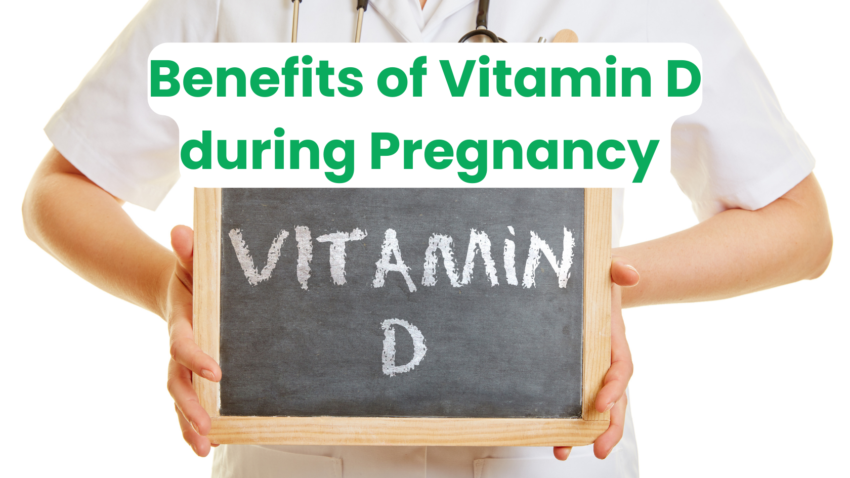Pregnancy is a significant phase in a woman’s life, and it comes with increased responsibilities for both the mother’s and the baby’s health. Proper nutrition during pregnancy plays a vital role in ensuring a healthy pregnancy and the development process of the baby. One essential nutrient that deserves attention during this period is Vitamin D.
In this article, we will explore the benefits of Vitamin D during pregnancy and why it is crucial for both the mother’s and the baby’s well-being.
Vitamin D, often referred to as the “sunshine vitamin,” is a fat-soluble vitamin that plays a crucial role in various bodily functions. It aids in the absorption of calcium and phosphorus, which are essential for strong bones and teeth, making it particularly important during pregnancy when the demand for these minerals increases.
Understanding Vitamin D
Vitamin D comes in two forms: Vitamin D2 (ergocalciferol) and Vitamin D3 (cholecalciferol). Vitamin D2 is commonly found in some plant-based foods and supplements, while Vitamin D3 is synthesized by the skin when exposed to sunlight and can also be obtained from animal-based sources.
Importance of Vitamin D during Pregnancy
Getting an adequate amount of Vitamin D during pregnancy is crucial for various reasons. Firstly, it ensures the proper development of the baby’s bones and teeth. Secondly, Vitamin D is essential for a well-functioning immune system, helping the mother and baby fight off infections and illnesses.
Sources of Vitamin D
Natural sources of Vitamin D include sunlight, fatty fish (such as salmon and mackerel), fortified dairy products, and egg yolks. While sunlight is an excellent natural source, it’s essential to strike a balance between safe sun exposure and the risk of skin damage.
Recommended Daily Intake of Vitamin D during Pregnancy
The recommended daily intake of Vitamin D during pregnancy varies depending on the country and health guidelines. Typically, pregnant women are advised to consume around 600-800 IU (International Units) of Vitamin D per day.
Vitamin D Deficiency and its Risks
Vitamin D deficiency during pregnancy can lead to various complications, such as gestational diabetes, preeclampsia, and preterm birth. It can also affect the baby’s bone development, leading to a condition called rickets.
Benefits of Vitamin D for the Mother
- Bone Health
Vitamin D helps the mother maintain her bone health during pregnancy. As the baby’s skeletal system starts developing, the mother’s body must provide enough calcium and Vitamin D to support both their needs.
- Immune System Support
A well-functioning immune system is vital during pregnancy, as pregnant women are generally more susceptible to infections. Vitamin D aids in strengthening the immune system, reducing the risk of illnesses.
- Gestational Diabetes Prevention
Studies suggest that sufficient Vitamin D levels during pregnancy may lower the risk of gestational diabetes, a condition that can lead to complications for both the mother and the baby.
Benefits of Vitamin D for the Baby
- Bone and Teeth Development
Vitamin D is critical for the baby’s bone and teeth development. Proper supplementation can help prevent skeletal problems and ensure the baby has healthy teeth as they grow.
- Healthy Birth Weight
Adequate Vitamin D intake is associated with a reduced risk of low birth weight, promoting healthier outcomes for the baby.
- Reduced Risk of Chronic Diseases
Some studies suggest that proper Vitamin D levels during pregnancy may lower the baby’s risk of developing chronic diseases later in life, such as asthma and autoimmune disorders.
Sun Exposure and Vitamin D Synthesis
While sunlight is an excellent source of Vitamin D, it’s essential to balance sun exposure with the risk of skin damage. Spending time outdoors during the early morning or late afternoon can be beneficial for Vitamin D synthesis.
Vitamin D Supplements during Pregnancy
In cases where it’s challenging to obtain enough Vitamin D from natural sources, supplements may be recommended by healthcare professionals to meet the required daily intake.
Vitamin D and Prenatal Depression
Some studies have suggested a link between Vitamin D deficiency during pregnancy and an increased risk of prenatal depression. However, more research is needed to establish a definitive connection.
Precautions and Considerations
Before starting any supplements, pregnant women should consult their healthcare provider to ensure the appropriate dosage and to rule out any potential interactions with other medications.
Combining Vitamin D with Other Nutrients
Vitamin D works in tandem with other nutrients like calcium, magnesium, and Vitamin K2. Ensuring a well-balanced intake of these nutrients can enhance the benefits of Vitamin D during pregnancy.
Conclusion
In conclusion, Vitamin D plays a vital role during pregnancy, benefiting both the mother and the baby. From bone development to immune system support, Vitamin D ensures a healthy and smooth pregnancy journey. However, it’s essential to strike a balance between natural sources of Vitamin D, such as sunlight, and considering supplements when necessary.
FAQs
• Can I get enough Vitamin D from sunlight alone during pregnancy?
While sunlight is an excellent source of Vitamin D, it may not always be sufficient to meet the increased demands during pregnancy. Supplementing with Vitamin D as per your healthcare provider’s advice is recommended.
• Are there any side effects of Vitamin D supplements during pregnancy?
When taken in appropriate dosages, Vitamin D supplements are generally safe during pregnancy. However, excessive intake can lead to Vitamin D toxicity, so it’s crucial to follow the recommended dosage.
• Can Vitamin D deficiency affect my baby’s growth?
Yes, Vitamin D deficiency during pregnancy can lead to stunted bone growth and may increase the risk of low birth weight.
• Are there any food sources of Vitamin D suitable for vegetarians during pregnancy?
Yes, some plant-based foods like fortified dairy products, soy milk, and certain mushrooms contain Vitamin D2, which can be beneficial for vegetarians.
• Is it possible to consume too much Vitamin D during pregnancy?
Yes, excessive intake of Vitamin D can lead to toxicity, causing symptoms like nausea, vomiting, and kidney problems. Always adhere to the recommended dosage.
